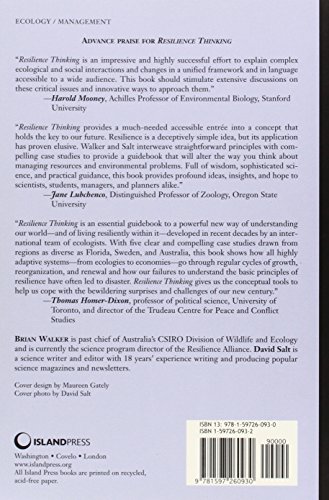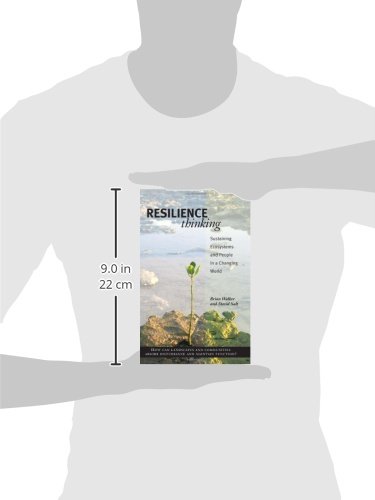معلومات عنا
حقوق الطبع والنشر © 2024 Desertcart Holdings Limited
Desert Online General Trading LLC
Warehouse # 7, 4th Street, Umm Ramool, Dubai, 30183, Dubai




Resilience Thinking: Sustaining Ecosystems and People in a Changing World
B**R
Like the author
I come from a background in conservation and complex systems. Like the author, I have been struggling to describe the very important worldview of systems thinking and the need to apply this thinking to ecological issues. Systems science has a language of its own which has yet to be translated for effective use by those conservation people who make important ecological decisions. I think of folks like the field biologists who work with public lands agencies. Honestly, the systems science people have a long way to go in describing their critically important ideas. The author of this book makes a valiant attempt to bridge the gap but is entrapped in buzzwords and dense text. He uses the word "resilience" when he should probably be describing ecosystems and sustainability in terms of Nature's interconnections (energy conduits) that hold these systems together by transporting and transforming energy. Broken connections are the driving force behind broken ecosystems and are the cause of reduced resilience/sustainability.I can't be too harsh because I find myself with the same struggle of trying to translate the systems research work of Santa Fe Institute (and others) into useful, applicable ecological knowledge at the field level.I have same the same minor complaints as other reviewers. The editing is poor in places. Someone from the outside should have worked with the author to make the book more readable . Nonetheless, the use of good case studies did offset the dense and often technical/obtuse writing.
S**H
A Resilient Introduction
This short book is an excellent introduction to resilience thinking. The core texts in this field tend to be rather daunting compendiums (see Gunderson and Holling's Panarchy) that only the already committed will read. This is a light introduction to the basic ideas and has lovely and useful case studies woven in. The core ideas of resilience thinking come from work in ecological systems theory over the past thirty years or so and are an application of work on complex adaptive systems. A key point is that natural and economic systems can only be understood and managed if their codependence is made explicit. Basic concepts such as regime (a set of connected stable states), threshold (boundaries between regimes) and the adaptation cycle (growth -> accumulation -> release -> reorganization) are well explained. The case studies cover The Florida Everglades, The Goulburn-Broken Catchment area in Australia, Coral Reefs in the Caribbean, the Northern Highland Lake District in Wisconsin and the Kristianstads Vattenrike Wetlands in Sweden. All of these cases come up frequently in conversations on resilience and are good touch points.I expect to see applications of resilience thinking to many areas beyond ecology and resource management over the next decade: it is widely relevant to organizational theory and urban planning. It will be one input to a new syntheses that replaces our current and obsolete economic theory.One small caveat, the book has some well done illustrations but the quality of the photos is dreadful.
E**E
Excellent book - simple and clear without being dumbed-down.
This is a fantastic little book. The presentation of complex adaptive systems and the things that determine how resilient they are is crystal clear and concise. My background is computer science research, with a fair amount of experience in complex systems from that angle, and this book was still excellent for putting things into simple and straightforward language without dumbing it down or skipping important connections.My other life is as a permaculture designer. If you're not familiar with that, permaculture is a discipline that seeks to build ecologically sound, self-sustaining human settlements. Currently there is very little in the permaculture literature regarding systems and resilience, and personally I think that this is the next big step forward. This book is the best introduction to those ideas that I've ever seen, and I heartily recommend it to anyone getting into permaculture design.
M**A
Resilience thinking can help you understanding change
The author presents us a view based on resilience and provides practical examples of application of this concept existing in several areas around the world.As a beginning this book is very helpful, once most of existing ecosystems are under considerable threats and need more complex management.
T**R
Basic Resilience Thoery primer
I used this book in my graduate research and when I missed placed it, several years past grad school, I had to buy it again for a reference. It is a short book, but packed with useful information to help you understand Resilience Theory. If authors Walker and Scott taught in the US I'd be signed up in a doctorate program with them. Definatly check out this book.
L**Z
Interesting take on env. mgmt.
I bought this book for a class on sustainable development systems. I haven't quite finished it cover to cover (yet), but I like the way that the authors ask readers to consider sustainability and environmental management by building into the system the ability to adapt to changes. I would recommend this book to others interested in thinking about change in systems.
I**Z
Recommended for everyone
This is a wonderful book to understand the concept of resilience and its relationship with sustainability. Very well written and the study cases make easy to grasp the deep conceptual meaning of system thinking.
V**X
Great topics discussed
Great topics discussed. Leans left as in progressive on its fews of the future sustainability of our ecosystem. I agreed with about 25% of the subject matter and do not agree with most of their predictive suggestions. A lot of reaching or predictable teachings.
G**C
Eye opening
There's something very profound at the core of this book. If it's hard to fully understand exactly what, it's no fault of the authors who explain the ideas remarkably clearly. Rather, I think the concepts challenge the reader to think in such a fundamentally different way that understanding, applying and reconciling them with current models of management, problem-solving, and developed-world 21st century living, seems almost impossible.The ideas cut across the natural and social sciences, and because they challenge us to alter our thinking and behaviour, they cross the boundary into the world of ethics and the humanities too. It's basically a book about systems thinking: it provides a theoretical basis for the law(s) of unintended consequences in the behaviour and management of complex systems. It's written engagingly with plenty of real-world examples, grounding all the conceptualising in reality.It's a slim book: succinct, easy to read, and can be polished off in a clear afternoon. But it leaves you wanting to know more. Although there are tantalising glimpses of how resilience theory might be applied to human systems, and the examples all involve an element of human (mis)management in a wider ecosystem, the ideas remain firmly rooted in the science of ecology. Of course, we're all part of one big social-ecological-geological system, but the vast majority of people are only consciously aware of the 'social' part, and the focus on settings which might seem unusual for typical developed world suburban readers-- such as the Florida everglades, Caribbean coral reefs, a rural region of Australia-- might leave them wondering quite how the concepts apply to them.That said, this is clearly a rapidly evolving field of study, and I don't know of a better introduction to it. Thoroughly recommended.
P**E
Everyone should read this book
This book summarises some important empirical and theoretical studies on social-ecological systems. The important issue is to build a common framework for studying complex systems that couple social activities with their impact on the natural world. Essentially it summarises the more extensive treatment in Panarchy Panarchy: Understanding Transformations in Human and Natural Systems , which I also heartily recommend, but of course in a much more accessible way.If you would like to get a more in depth understanding of how our actions impact on natural ecosystems, and what we may be able to do about it, then do read this book. I wish everyone on the planet would read it! Panarchy: Understanding Transformations in Human and Natural Systems
C**F
The only way!
Resilience is on top of the list for the real solutions alternatives to climate change and fossil fuel dead end.
J**H
gOOD BOOK IN PAPERBACK FORMAT, COST EFFECTIVE
on line university study
M**R
One Star
Still reading it - very good so far
ترست بايلوت
منذ 5 أيام
منذ شهرين